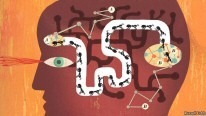Tom Stafford's Blog, page 129
August 23, 2010
The psychology of advertising in the Mad Men era
 Film-maker Adam Curtis has just posted a fascinating look into how the Madison Avenue advertising agencies of the 1960s first understood and applied psychology to marketing.
Film-maker Adam Curtis has just posted a fascinating look into how the Madison Avenue advertising agencies of the 1960s first understood and applied psychology to marketing.
As well as his account of these early forays into the consumerist mind he also posts some wonderful archive footage of the ad agencies' training and discussions and some never before broadcast interview footage he recorded himself.
You may know Curtis from his numerous sociological documentaries, most notably The Century...
An epidemic of ghosts
 Mozambique is being ravaged by an epidemic of spirit possession. These 'outbreaks' have traditionally been dismissed as superstition by commentators from afar, but it is becoming increasingly recognised that different cultures have different ways of expressing mental distress and social anguish – to the point where a team of medical scientists have just published the first large scale epidemiological study on spirit possession and its link to mental and physical illness in post-civil war...
Mozambique is being ravaged by an epidemic of spirit possession. These 'outbreaks' have traditionally been dismissed as superstition by commentators from afar, but it is becoming increasingly recognised that different cultures have different ways of expressing mental distress and social anguish – to the point where a team of medical scientists have just published the first large scale epidemiological study on spirit possession and its link to mental and physical illness in post-civil war...
August 22, 2010
When justice fails
 I've just read a jaw-dropping Slate interview with the co-founder of the Innocence Project, an organisation that has uncovered hundreds of wrongful convictions on the basis of DNA analysis techniques which weren't available when the case was prosecuted.
I've just read a jaw-dropping Slate interview with the co-founder of the Innocence Project, an organisation that has uncovered hundreds of wrongful convictions on the basis of DNA analysis techniques which weren't available when the case was prosecuted.
The interview is repeatedly astounding and has some terrifying insights into personal conviction, group think and the difficulty of admitting errors.
It tackles how individual motivations and perception mesh with the social structure and tools o...
In the eye of the swarm
 The Economist has a great article on how computer models of how bees, ants and birds operated in swarms, are being deployed as 'artificial intelligence' systems to solve previously unassailable problems.
The Economist has a great article on how computer models of how bees, ants and birds operated in swarms, are being deployed as 'artificial intelligence' systems to solve previously unassailable problems.
To be honest, the premise of the piece is a little too grand to be plausible: the introductory paragraph announces "The search for artificial intelligence modelled on human brains has been a dismal failure. AI based on ant behaviour, though, is having some success."
This is really not true, as ...
August 20, 2010
2010-08-20 Spike activity
Quick links from the past week in mind and brain news:

New Scientist has a good feature article on how 'crossing the senses' can help blind people 'see' with sounds and the like.
There's good update on the biology and effects of the recently ex-'legal high' mephedrone over at DrugMonkey.
NPR has been running a good series on 'How Evolution Gave Us The Human Edge' that has lots of interesting psychology segments.
fMRI analysis in 1000 words. Awesome guide to the multiple complex steps involved in ...
August 19, 2010
Determined to fail: free will and work success
 If you want to predict how well someone might perform in a new job, you might want to enquire about their views on whether we are free to choose are own actions.
If you want to predict how well someone might perform in a new job, you might want to enquire about their views on whether we are free to choose are own actions.
A delightful study just published in the journal Social Psychological and Personality Science found that belief in free will predicted job performance better than conscientiousness, belief in influence over life events and a commitment to a 'Protestant work ethic' where diligent labour is seen as a benefit in itself.
Here's the...
Thumb sucking was a brain disease
 I've just discovered an astounding article from the journal Medical History that left me, dare I say, open mouthed. It's about how, in the early 1900s, thumb-sucking in children was considered a neurological disorder that was thought serious enough to justify paediatrics as a separate medical speciality.
I've just discovered an astounding article from the journal Medical History that left me, dare I say, open mouthed. It's about how, in the early 1900s, thumb-sucking in children was considered a neurological disorder that was thought serious enough to justify paediatrics as a separate medical speciality.
It sounds ridiculous now, but at the time these were serious concerns and thumb-sucking merited a place in medical textbooks where it was thought to be responsible for dental damage – a...
A cultured gene
 Not Exactly Rocket Science covers a eye-opening study that looked at an interaction between genetics and social behaviour. So far, so normal, except that the researchers found that the gene in question, involved in sensing the hormone oxytocin, had a different effect on social behaviour in American and Koreans.
Not Exactly Rocket Science covers a eye-opening study that looked at an interaction between genetics and social behaviour. So far, so normal, except that the researchers found that the gene in question, involved in sensing the hormone oxytocin, had a different effect on social behaviour in American and Koreans.
The study looked at how often people will 'reach out' to others for help and emotional support when they under stress, something that is more acceptable in the US than in Korea, and...
August 18, 2010
The brain machine interface of the old ones
 Brain-machine interfaces have been of huge interest to the press over recent years, particularly as the technology sparks concerns that have been the subject of numerous science-fiction fantasies.
Brain-machine interfaces have been of huge interest to the press over recent years, particularly as the technology sparks concerns that have been the subject of numerous science-fiction fantasies.
I found a lovely offbeat example of a fictional brain-machine interface, not from recent high-tech science fiction, but from a H.P. Lovecraft horror story called 'The Whisperer in Darkness' – written way back in 1930.
It concerns a race of winged fungi creatures who transport themselves across the...
Flowers, falling maple leaves and wriggling dwarves
 I love this summary of a study on unusual hallucinations in an elderly Japanese lady.
I love this summary of a study on unusual hallucinations in an elderly Japanese lady.
The full article is in Japanese but the translation of the abstract and the form of her hallucinations gives it a stylised quality that reminds me of the traditional art from the country.
The last sentence is wonderfully zen-like.
[Formed visual hallucination after excision of the right temporo parietal cystic meningioma--a case report.:]Brain Nerve. 2010 Aug;62(8):893-7.
Yoshimura M, Uchiyama Y, Kaneko A...
Tom Stafford's Blog
- Tom Stafford's profile
- 13 followers



